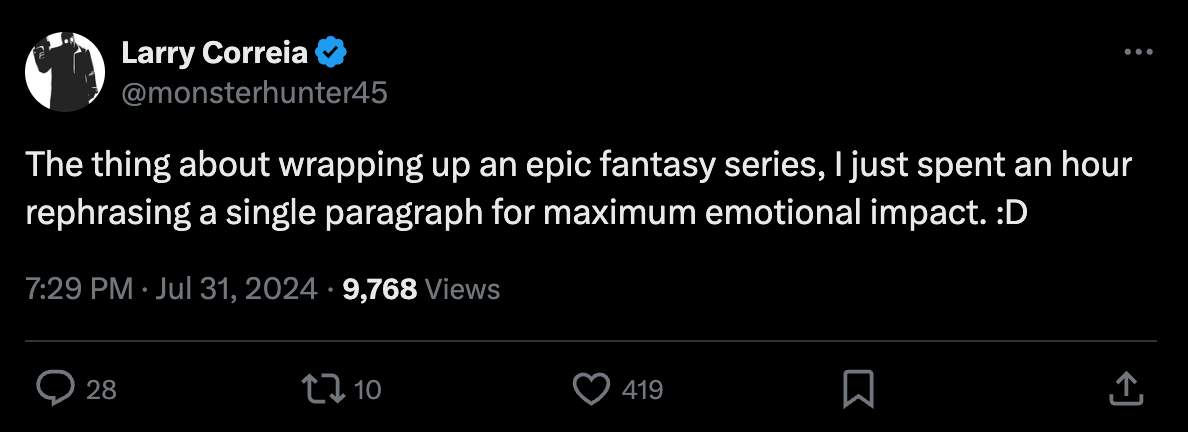The Importance of an Opening Line
Crafting Tone
The single line in my debut novel, “The Caretaker,” that I spent the most time on was the opening line.
It sets the tone for the entire story and in fact (if I do say so myself) has been crafted carefully for not only immediate impact, but to draw in the reader, and as foreshadowing to the entirety of the book from the first page to the last.
And I do this in 11 words.
First, a little about the story, then the line and a breakdown.
I wrote this book across 2018-2020. The story itself was NOT as I originally intended because, well, I didn’t really intend anything.
It was a writing prompt. A simple 500-word exercise that turned into something that consumed me. I hated writing it. I loved writing it. I want to write it again, and I never want to read a single word of it.
It’s complicated.
You see, this story was birthed with a simple question:
“What is the oldest item in your possession?”
That question was posed to a small writer’s group and I went home not thinking much of it, just figuring I’d put down 500 words to answer it as a little exercise to do something different.
Then I got to thinking.
Oldest item in my possession would be boring. What would the oldest item on Earth look like? What about the oldest item in the universe?
What about the oldest item in existence itself?
And that got me thinking - it has to be representative of something greater, and something abstract.
What if the oldest item in existence was a knife represeting death, itself?
Or in this case … Death, Herself.
The physical manifestation of the abstract concept of death is where my brain went, because when you are locked in my head (speaking from experience here), nothing comes easy.
It’s with this supernatural basis that I started developing a story about a man (protagonist William St. Denis), who is temporarily on Earth just like the rest of us, though gifted with unnaturally long life as part of his responsibility - Caretaker for Death, Herself - who exists in our physical realm as a blackened blade.
The story spun on from there and it’s something that’s very, very close to my heart (if you know the story, pun intended).
I was 5,000 words into the story when my brother suddenly passed away, and that altered the trajectory of this novel forever. It’s hard to read certain portions to this day, about four years later. I poured my coping, my effort, and my creativity into The Caretaker to avoid facing the loss of someone I loved dearly.
When it was over, I broke. But that’s a different story. Let’s talk about the first line now that you have a set-up.
With a little luck, I’d be dead in exactly twenty-three minutes.
Seems innocuous enough, and that’s the point. The mark of a great first line in an adventure (in this case Urban Fantasy), to me, is one that asks questions and has far-reaching significance well into the story, all the way up to the end.
That’s what I crafted here.
This line represents four questions I’m immediately stuffing into your brain (as the reader).
Why is being dead the goal?
Why does the protagonist need luck?
Why twenty-three minutes?
What happens if it’s not “exactly?”
Mind you, I also annihilate adverbs in my work other than dialogue, the presence of “exactly” carries a great deal of significance in the context of my writing method and storytelling style.
Every word with intention. I worked on this line for a long, long time. A few years ago at LibertyCon, I presented the first chapter to a very well-known and well-respected publisher. He opened the cover, read the first line, closed the cover and looked at me before saying:
“That’s one hell of an opening line.”
It’s deeper than just these four questions, but I’m not doing a deep-dive into the entirety of the story and the background of what happened right before these events take place. The first chapter puts in some effort to answer these questions to a degree, but you’ve got to hit page 200+ before you fully realize the significance of this opening line.
To me, those questions created by stripping out unnecessary words and getting to the point right off the bat is key. It sets the tone, it sets the pace, and it immediately creates thoughts in a reader’s brain of unfinished mysteries.
Resolving those questions will take turning pages, and that’s exactly what this book is intended to do. One of my most common reviews is about how the book couldn’t be put down, how people power through it, and how they didn’t want to stop reading, 3AM be damned.
As authors I think we lose sight of what can entertain a reader and how much power lies in words in terms of bringing that reader along for a journey. We end up focusing so much on setting, how people look, and (to be perfectly honest) self-serving descriptions of scene and character.
Taking yourself out of the work to really hone in on crafting an adventure in the reader’s mind is the trick here. It’s hard to step back and not see your own work with a magnifying lens, but when you’re able to take a gander at the big picture, you can spend time and effort crafting amazing lines with amazing impact.
I recently spotted this tweet from Larry Correia, that sums up what it’s like to diligently craft a line in your work:
It’s true, certain moments in your work require a little extra, so take the time with either your first line or your last.
You got this! ;-)
-David




